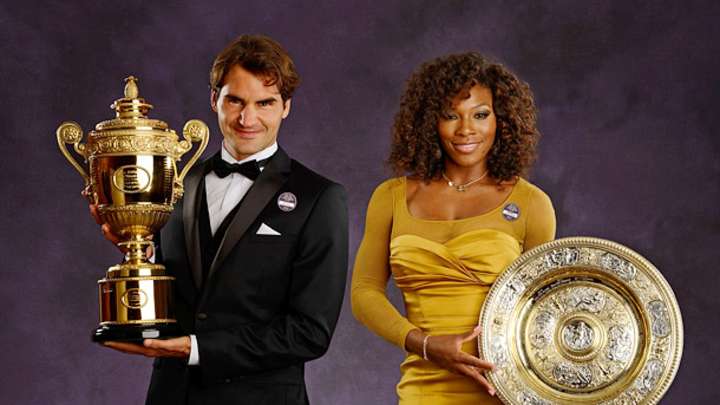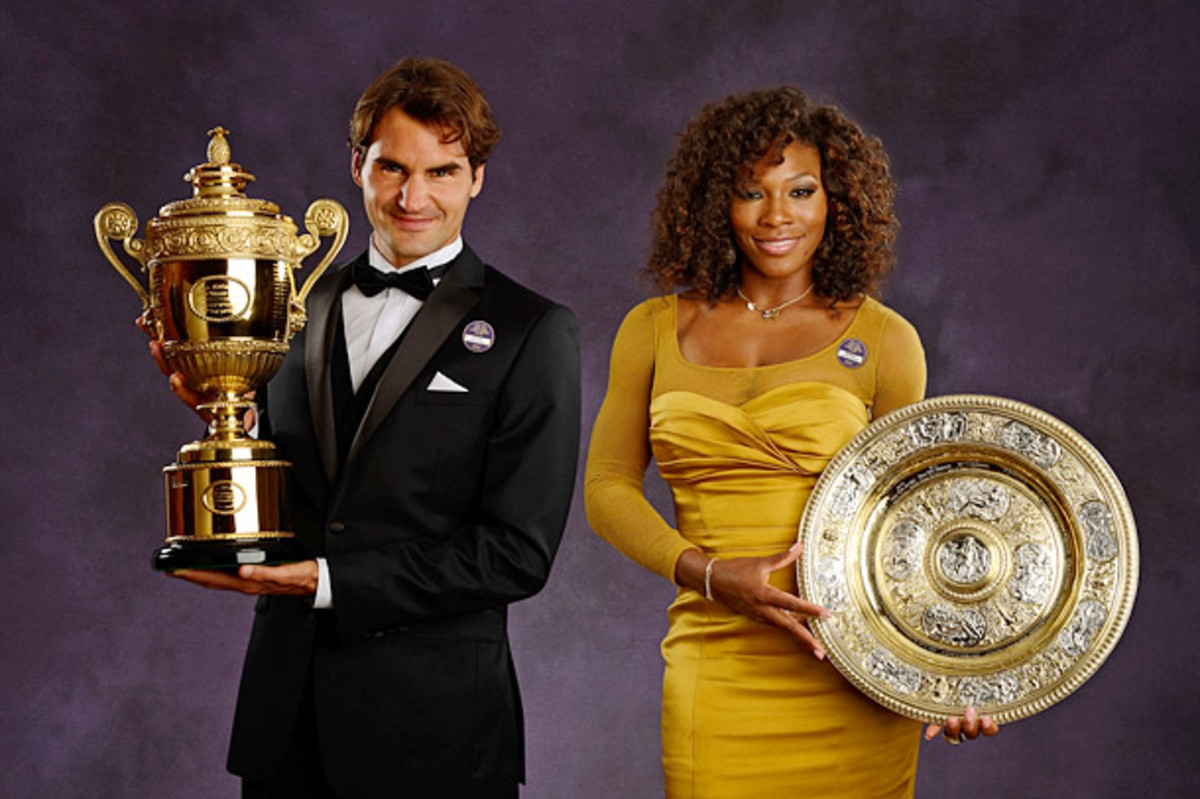The Toss: Importance of Wimby titles for Roger Federer, Serena Williams

Roger Federer won his record-tying seventh Wimbledon title and Serena Williams collected her fifth. (Usetom Lovelock/AFP/GettyImages)

Today's Toss: SI.com's Bryan Armen Graham joins Courtney Nguyen this week to examine the following question: Which Wimbledon title was more important in the context of careers: Roger Federer's or Serena Williams'?
Courtney Nguyen: For me, this year's tournament will go down as the best Wimbledon fortnight since Goran Ivanisevic took over the All England Club in 2001. Given the depth of the excitement and quality -- even the doubles finals were must-see TV -- I'd even argue that 2012 was superior. And before we could even think to dismiss the 2012 Championships with a patronizing pat on the head and a "Well, that was a wild and wacky couple of weeks," two of the all-time greats put the perfect coda on the tournament, reminding everyone that though we may live in a world where Lukas Rosol upsets Rafael Nadal, we also still live in a world where Roger Federer and Serena Williams can play lights-out tennis and lift the biggest trophies in the sport.
So what do you make of our Wimbledon champions? Which win was more important, Roger's or Serena's?
As great as it was to see Federer glide around the court and pummel his forehand like he was 25 -- and thus return to the top and compile more records than I dare to count -- Williams' comeback meant so much more.
Expect the unexpected. That's the mantra when dealing with Serena Williams and that's precisely what happened. After undergoing two foot surgeries and having emergency care for a hematoma that resulted from treatment for blood clots in her lungs, she returned to the tour last summer and blasted through the U.S. hard-court season. She rolled to titles in Stanford and Toronto and absolutely dominated the field as she charged into the U.S. Open final. We all know what happened then. She ran into Samantha Stosur, blew her cool with umpire Eva Asderaki and lost. Great run, tough luck to face a really sharp Stosur.
Three-plus months later, she looked in form to open the season in Australia. Then she injured her ankle at Brisbane and fell in the fourth round of the Australian Open to Ekaterina Makarova. Bad timing, bad luck.
Move ahead another four months. Williams cruised through the clay season, winning Charleston and Madrid and making the semifinals of Rome before withdrawing out of precaution. Then, boom. She began the French Open with a loss to a woman outside the top 100, Virginie Razzano, who dealt Williams her first career defeat in the first round of a Grand Slam tournament. That's not bad timing or bad luck. That's just bad.
When Williams came to Wimbledon two weeks ago, she was at rock bottom emotionally. But she fought her way through a series of difficult matches, and by the time the quarterfinals rolled around, she had rediscovered her champion's aura. Three matches later, she was holding the Venus Rosewater Dish and the Old Serena was back. She was joking, laughing and taking swigs out of her strategically placed Gatorade bottle, but this time she had perspective. Her tearful thanks to family and friends who slept in chairs and couches in the hospital, refusing to leave her side during her medical scares. Her noticeable desire and efforts to protect and support her older sister throughout their doubles campaign. And her decision to uphold her commitments and fly all the way back to California to play at the Bank of the West Classic this week at Stanford. She might not have done that in years past.
Williams has never shied away from admitting that she's a spoiled brat. She gets what she wants, others be damned. But for two years, she didn't get what she wanted. No matter how hard she worked, how fit she got, how many lead-up tournaments she played, she always fell short, because of injury, luck or doubt. She says she spent months asking herself what she had done to deserve it all. As though the stars had somehow aligned against her.
[polldaddy poll=6386340]
The spoiled Serena would have been inclined to give up. But she worked even harder after that French Open loss, bringing in French coach Patrick Mouratoglou as an adviser (an almost unheard of move in the Williams clan). So instead of throwing herself a pity party, Williams trudged forward, her strong shoulders bearing the baggage from two years of disappointment, and she willed herself to her fifth Wimbledon title.
This title finally validated all her efforts toward getting back to the top. As a result, it looks like (and given her penchant for inconsistency, who knows if this will hold true) we've got ourselves a more dedicated and mature Serena. One who now knows she can't just treat the tour as optional and she can't just waltz into tournaments these days unprepared and expect to win. In the context of her career, that's a game-changer.
Bryan Armen Graham: Numerology is the language of wonks, from baseball fans (56, 715, 2,130) to LOST junkies (4, 8, 14, 16, 23, 42). Fedophiles are no exception, and the updated numbers surrounding Wimbledon's once and present king -- 1, 7, 17, 286 -- tell a compelling story.
Federer reclaimed the No. 1 ranking with his record-tying seventh Wimbledon title and record-extending 17th major championship, matching Pete Sampras' record of 286 weeks atop the ATP rankings. So much for the deposition. The 30-year-old Swiss now has more majors than Nadal and Novak Djokovic combined. After entering Wimbledon in alarming proximity of falling into losing records with the three great opponents of his era, Federer is now even or better with everyone but Nadal. The eight years, five months and one week between Federer's first week atop the charts and his most recent? You guessed it: another record.
Sure, Serena's victory did much to underpin an aura that took an irreparable hit with her inscrutable come-from-ahead loss to Razzano in the opening round of the French Open, but few believed -- even with her well-documented medical woes -- that she was through contending for majors given the chronic instability at the top of the women's game. Not so for Federer, given the Djokovic-Nadal diarchy that had combined to win the previous nine major titles. Many believed, despite his outrageous streak of Grand Slam quarterfinals, that his days of breaking through at the business end of majors were behind him.
